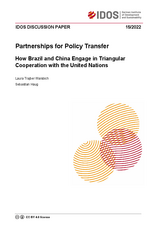Discussion Paper
Partnerships for policy transfer: how Brazil and China engage in triangular cooperation with the United Nations
Waisbich, Laura Trajber / Sebastian HaugDiscussion Paper (15/2022)
Bonn: German Institute of Development and Sustainability (IDOS)
ISBN: 978-3-96021-193-8
DOI: https://doi.org/10.23661/idp15.2022
This paper offers a comparative analysis of Brazilian and Chinese partnerships with the United Nations (UN) as a mechanism and channel for policy transfer. In international policy travel flows, China and Brazil currently hold privileged places as hubs from which development-related policies travel and through which they circulate. Both countries have invested in systematising their development experience and transferring development policies within their regions and beyond – often through triangular cooperation, i.e. South–South cooperation supported by third actors such as UN entities. So far, however, this variegated engagement has remained under the radar of scholarly attention. To address this gap, we examine 35 policy transfer partnerships – 17 for Brazil and 18 for China – forged with different parts of the UN system over the last two decades. In order to offer a first systematic account of partnership trajectories, we provide an overview of partnership types (namely projects, programmes and policy centres) and transfer dimensions (including the policies themselves, transfer agents and governance arrangements). Our comparative mapping presents an evolving landscape: while Brazil was first in institutionalising robust policy transfer partnerships with numerous UN entities and then slowed down, China started more cautiously but has significantly expanded its collaboration with the UN system since 2015. The partnerships analysed cover a substantial range of sectors, with a particular focus – for both Brazil and China – on agricultural policies. While Brazilian partnerships with the UN primarily engage with linkages between agriculture and social protection, however, China–UN partnerships focus more on productivity and market linkages. As the first comprehensive mapping and comparative analysis of Brazilian and Chinese policy transfer partnerships with the UN, this paper contributes to a better understanding of (triangular) cooperation schemes between international organisations and their member states, as well as debates about how policies deemed as successful travel around the globe.
Contact
Cornelia Hornschild
Publication Coordinator
E-mail Cornelia.Hornschild@idos-research.de
Phone +49 (0)228 94927-135
Fax +49 (0)228 94927-130
Alexandra Fante
Librarian/ Open Access Coordinator
E-Mail Alexandra.Fante@idos-research.de
Telefon +49 (0)228 94927-321
Fax +49 (0)228 94927-130




![[Translate to English:] Photo: Alexandra Fante, Bibliothekarin/Open Access-Koordinatorin](/fileadmin/_processed_/f/0/csm__c_Deutsches-Institut-fuer-Entwicklungspolitik_Fante_94ce4fa1ba.jpg)